Posted: 20/10/22
German and British engineers bring their skills together
New friendships and great engineering and collaboration skills have been built between students at West Nottinghamshire College and a German technical school, during the first part of an exchange programme.
-
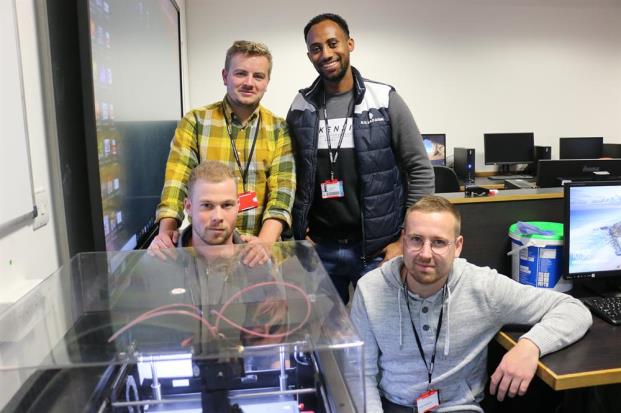
David Stenzel with advanced engineering student, Ghrmay Kibreab. Seated is Max Blasche and Simon Heitkamp
-
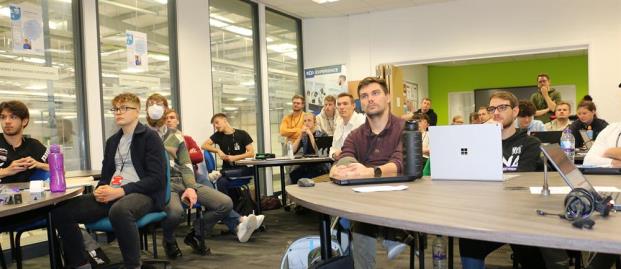
The guests from Osnabruck enjoyed seeing the facilities at the EIC
-
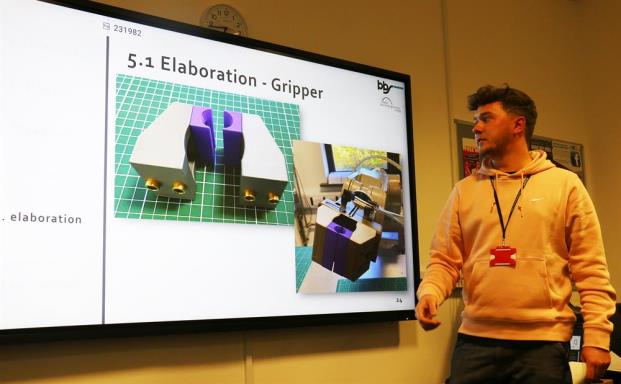
Each group designed a storage solution for material tensile testing samples
-
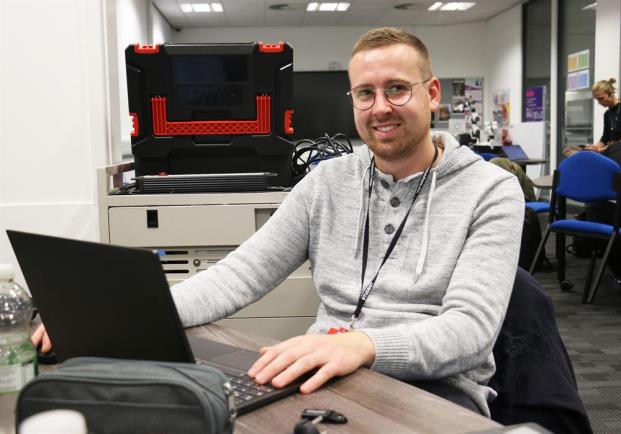
Simon Heitkamp making a start on his designs
-
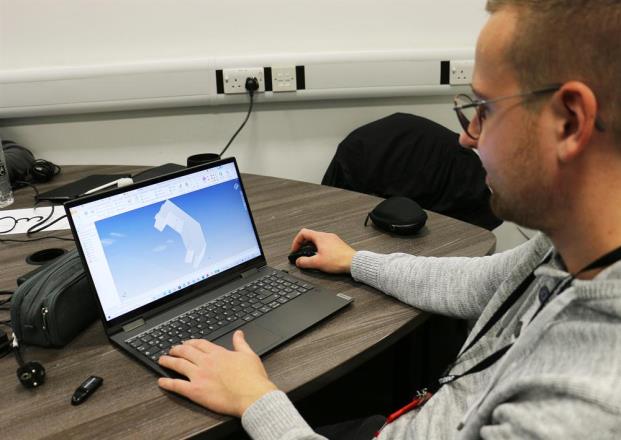
The German visitors worked in groups with engineering students from the college
-
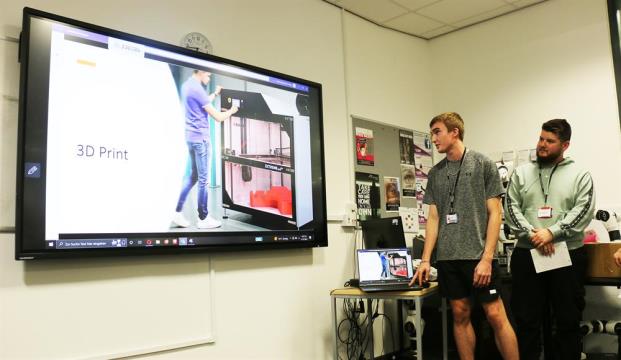
At the end of the fortnight, groups presented their findings
-
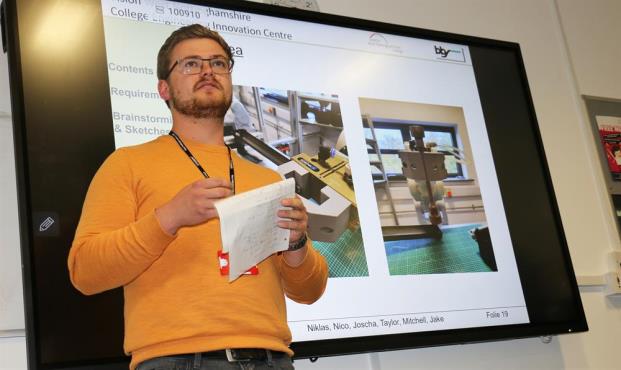
Each group had to test the parts for strength
-
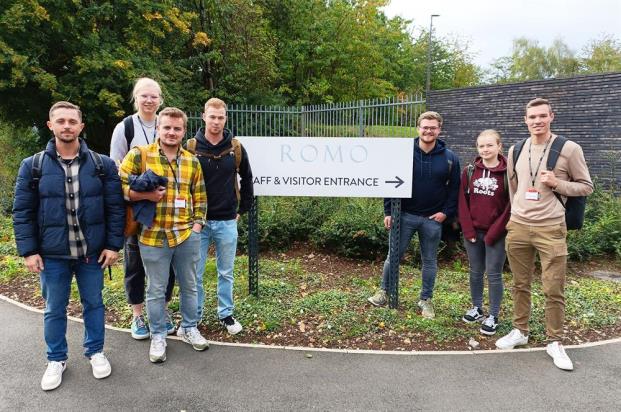
At Romo factory in Kirkby-in-Ashfield
-
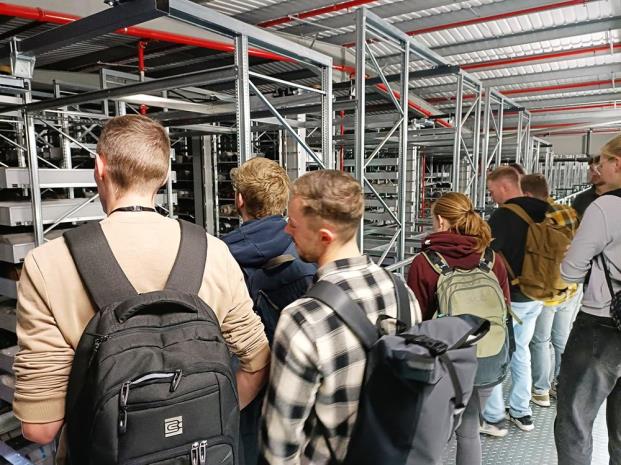
During a trip to Romo, students and guests saw the automated picking and storage system
The college’s Engineering Innovation Centre has played host to 24 diploma-level students from the Berüfsbildende Schulen in Osnabruck Brinkstrasse, Germany, over a two-week period.
The visit formed part of an exchange programme which is funded by Erasmus+, a European social-mobility programme for education, training, youth and sport; and is the German college’s fourth visit to West Nottinghamshire College since 2016.
The visitors were placed in project groups with students from the Extended Diploma in Advanced Manufacturing Engineering, to work together on a project in the engineering workshops. The project challenged groups to design a storage solution for material tensile testing samples.
Each group was set the task to produce a gripper for one of the department’s ABB robots, set the robot to collect a sample and supply it to the tensile testing machine. Groups were asked to complete a diary of the project and present their final design solutions to the other groups at the end of the two weeks.
Working closely with the college’s state-of-the-art robotics, CAD and 3D printing facilities, the groups used their engineering skills, creativity and attention to detail to fulfil the project, with each group appointing a project manager, design engineers, production engineers and a sales engineer.
Teachers also presented the department’s hydraulic and pneumatic training rigs made by German automation company, Festo. The visitors were shown how this equipment is used to build and simulate real-world engineering applications.
Throughout the two-week visit, the visitors were also introduced to Kirkby-in-Ashfield company, Romo. Romo is the founding brand of The Romo Group and produces fabrics and wall coverings at its factory situated just a few hundred metres from the engineering campus on Oddicroft Lane.
The students were able to tour the site including the automated picking and storage system and watch the entire production process from picking, material handling and cutting, through to production and finally dispatch.
A sporting afternoon was organised for the visitors over at the college’s Derby Road campus. This saw sports coaching students set a range of activities including football.
Head of the college’s engineering department, Benjamin Toule, said: “It was fantastic to see the collaboration between the students from two different colleges. They worked well together to produce some excellent designs and products that showcased the engineering skills of both sets of students.”
One student from the Berüfsbildende Schulen in Osnabruck, David Stenzel, 27, said: “It’s been a great thing to learn about how our different school systems work. There are many similarities and some differences between the ways we study.
“We work in the industry before we go into the studies. We are also a little bit older than most students at West Notts. It’s been a good experience to share our knowledge.
“It was good to visit Romo too. It’s a very bright, clean building which shows off the very best of their business.”
West Notts advanced engineering student, Ghrmay Kibreab, said: “It’s been a very interesting time with our visitors and working on the collaborative project. We’ve learnt a lot from them as they have a lot of workplace experience which we’ve been able to discover more about.”
The college’s bid writer and projects co-ordinator Kadri Saat said: “Erasmus+ activities have provided positive results for both the college and the individuals taking part. The chance to spend time in another European country, working, training or studying, means that students and staff return with fresh perspectives, energised and more motivated.
“We are hopeful that the new Turing programme allows us to continue deliver placements and exchanges across the world. This project will place stronger emphasis on including young people from deprived backgrounds, so they too can experience life-changing activities.”